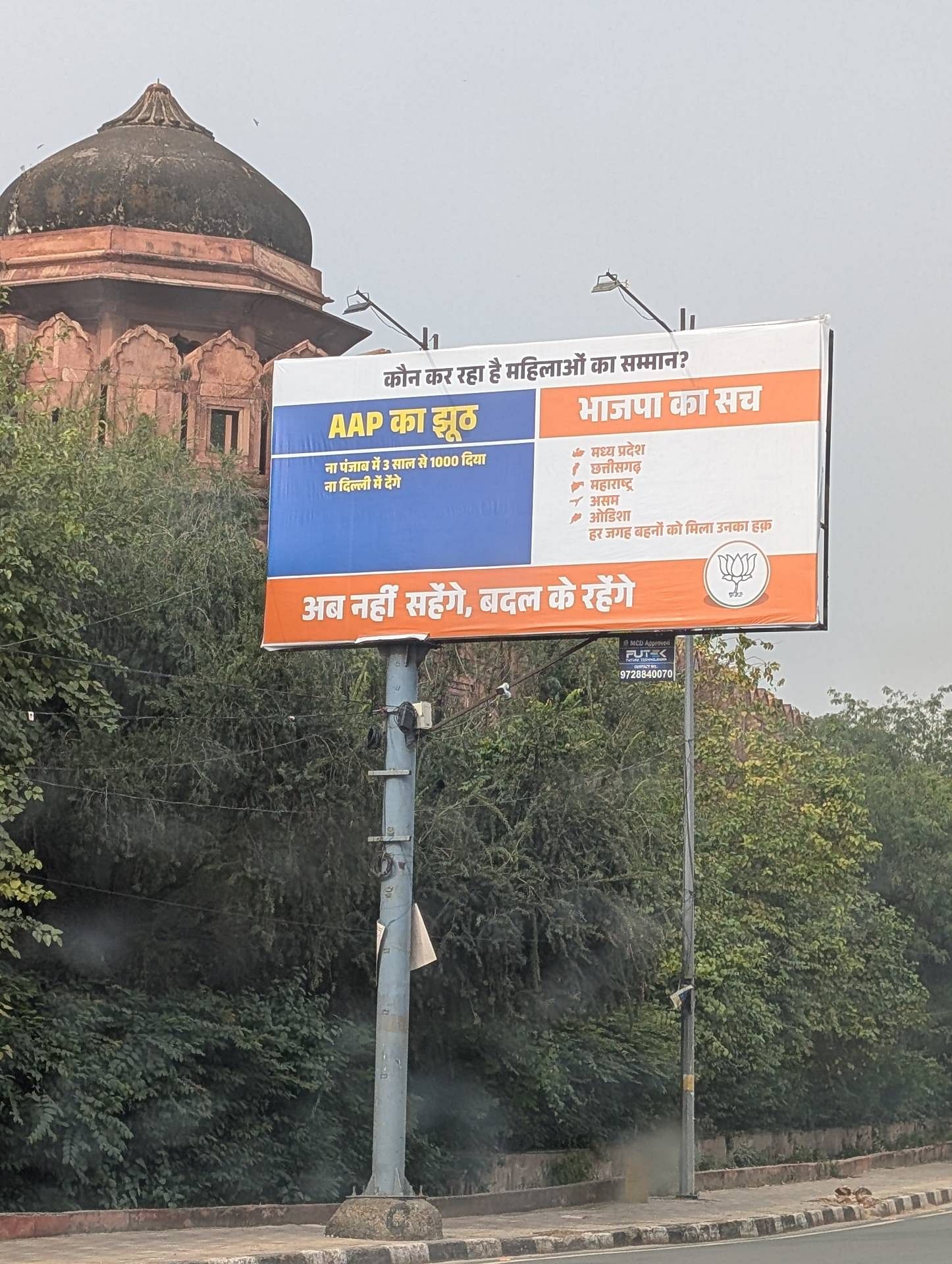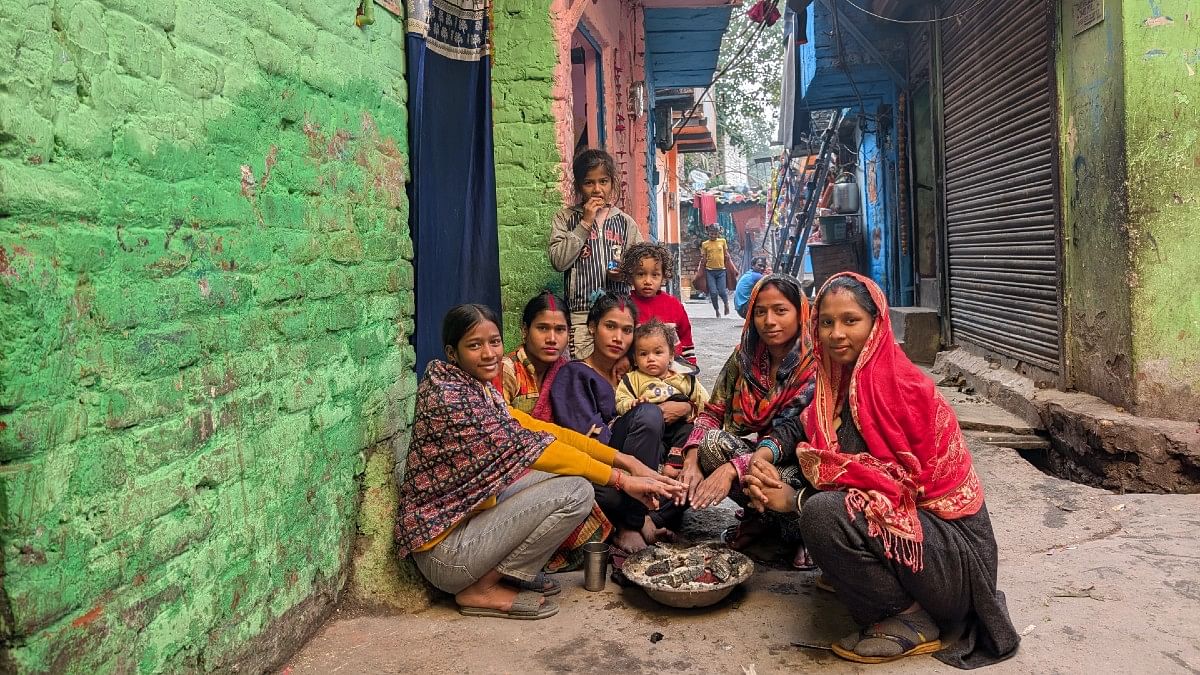The Opposition is predictably making the best of it. In areas across Delhi, posters “exposing” AAP’s “lies” have made their way to the narrowest of lanes. These posters, put up by Bharatiya Janata Party (BJP), claim: “Those who couldn’t give 1,000 rupees in Punjab, how would they give 2,100 rupees in Delhi?”
This article is NOT paywalled
But your support enables us to deliver impactful stories, credible interviews, insightful opinions and on-ground reportage.
Bigger hoardings across Delhi make a checklist for voters. On the left, “AAP’s lies” are highlighted in blue: “Neither did they give Rs 1,000 in Punjab for three years, nor will they give it in Delhi.” On the right is “BJP’s truth”—”Madhya Pradesh, Chhattisgarh, Maharashtra, Assam, Odisha, everywhere, women have received their rights”.

These posters and hoardings seem to be resonating with the voters on the ground, with Delhi set to vote on 5 February.
Kamlesh, a 40-year-old sweeper with the New Delhi Municipal Corporation, says that she does not believe in the Rs 2,100 promise.
“They did this in Punjab too, but women there are saying that they haven’t received the money. We hear it in the news,” she says, but maintains that Kejriwal is better for Delhi, while Prime Minister Narendra Modi is fit for running the country.
For supporters and non-supporters alike, the promise does not seem to be functioning as the swaying pitch that AAP hoped for.
While AAP is seeking a third term, it is facing opposition from BJP as well as the Congress.
Also Read: Cracks widen in INDIA bloc as allies isolate Congress, back AAP for Delhi polls & question coalition
The ‘broken promise’ in Punjab
Krishna, 54, a driver living in Shakurpur JJ Colony in Northwest Delhi, gets into an argument with two of his friends—Sanjeev, an electrician, and Pradeep, who runs a transport business—when discussing Kejriwal and his work. The two sing paeans about Kejriwal’s work in Delhi’s schools and Mohalla clinics.
“Look at the schools… Earlier children used to sit on tat patti (floor mat), now they have benches. Have you ever seen parents meeting in schools? Now they have such nice meetings,” they assert, but Krishna isn’t convinced. “It’s just on paper, he hasn’t done anything on the ground.”
The three of them argue over every development-related plank that Kejriwal furthers. However, when it comes to the promise of Rs 2,100, Krishna wins the round without much argument from the other two. “It has been three years since they promised 1,000 in Punjab, what will he give here?” he asks.
A monthly allowance of Rs 1,000 to women aged 18 years or above was one of the five guarantees by AAP, ahead of the February 2022 Punjab assembly elections. However, three years later, the promise remains to be fulfilled.
AAP Chief Spokesperson Priyanka Kakkar tells ThePrint that their priority when AAP wins any state is to cater to the health infrastructure and the school education.
Highlighting the work done by AAP in Punjab with regard to education and health infrastructure, Kakkar says, “Because Arvind Kejriwal ji has spoken about Rs 1,000, this shall also be done. The people of Punjab trust us immensely. That is the reason we won three of the four bypolls. We also won the municipal elections, which were recently held.”
She adds, “This shows that people have immense trust in Arvind Kejriwal ji’s guarantees, and the women of Punjab know that this will also be fulfilled within our term.”
This is not the first time that the AAP government in Delhi has promised a monthly allowance for women. Announcing the payout of Rs 1,000 a month in the 2024-25 budget in March 2024, Finance Minister Atishi had said that the first instalment under the scheme would be disbursed by September-October.
However, the cabinet approved the scheme only on 12 December last year. The delay in approval has been attributed to Kejriwal being jailed last year, because of which the requisite Cabinet meetings were not conducted.
Besides, according to reports, the planning and finance departments had also raised concerns over the implications of the scheme. While the planning department felt that the scheme may discourage women to seek employment, the finance department had pointed out that the scheme may have a projected financial liability of Rs 4,560 crore in 2025-26, which would exert fiscal stress.
While announcing cabinet approval for the scheme on 12 December, Kejriwal had then announced that Rs 1,000 monthly assistance had been approved, and promised that the amount would be raised to Rs 2,100 after the elections.
However, the scheme hasn’t been notified in the gazette yet. Consequently, last month, the Delhi Department of Women and Child Development issued a notice, claiming that no such scheme had been officially notified by the Delhi government, leading to a political showdown with AAP alleging foul play over issuance of the notice.
Delhi Lieutenant Governor Vinai Kumar Saxena has also initiated an inquiry into the allegation that “non-government” people were collecting personal details of Delhi residents in the name of registration for AAP’s proposed welfare scheme.
In East Delhi’s Geeta Colony, a group of women crouch in front of an angeethi (brazier).
Among them, 22-year-old Jyoti remembers the Rs 1,000 promise. “They collected everybody’s IDs too, but did they give it? Now they’re claiming they’ll give us ₹2,100. When they couldn’t muster up Rs 1,000, how will they give Rs 2,100?”

Anita Devi, 40, chimes in, saying that the forms that they are supposed to fill only ask for their voter IDs and phone numbers, not their Aadhaar numbers, which adds to her scepticism. “That is why I haven’t even registered yet…They won’t do anything, it’s just for the votes.”
However, the AAP spokesperson maintains that the promise will be implemented in Delhi, just like the party’s previous promises of free electricity and water.
“In Delhi, when we said…Paani Half, Bijli Maaf. Even then the BJP had laughed, but we did it. When we spoke about bus rides for women, BJP had protested, but we did that as well. When we wanted to put up CCTVs, even then BJP had protested, but we got them installed,” Kakkar tells ThePrint. “This is why people of Delhi know Arvind Kejriwal ji does what he says. It is his guarantee that every woman in Delhi will get Rs 2,100 per month and it will happen.”
‘AAP promises, BJP delivers’
The ruling party in Delhi is hoping that the new promise will work successfully, the same way it did for the BJP in Madhya Pradesh and Maharashtra. However, two BJP MLAs are allegedly attempting to trump this by distributing Rs 1,100 to women in Kejriwal’s own New Delhi Constituency.
In the last week of December, AAP leader Sanjay Singh had filed a complaint with the Enforcement Directorate (ED), accusing two BJP leaders, Parvesh Verma and Manjinder Singh Sirsa, for allegedly distributing cash to people ahead of the polls.
Kejriwal has been representing the New Delhi seat since 2013 in the assembly, and is the AAP candidate from the constituency this time as well.
On 9 January, Kejriwal also wrote to the Election Commission of India, alleging that Parvesh Verma was distributing Rs 1,100 to women under the garb of a fake “Laadli Behen” scheme.
ThePrint visited New Delhi constituency’s Valmiki Basti on 31 December, when several women residents recounted having received Rs 1,100 from BJP. To them, the money is physical evidence of monetary benefit from the BJP, contrary to promises of monthly allowance by AAP.
In his defence, Parvesh Verma has claimed that the money was distributed by Rashtriya Swabhiman, an NGO founded by his father and former Delhi chief minister Sahib Singh Verma. Media reports quoted him as saying that the NGO provides monthly financial assistance to women from poor sections of society.
Meeta, a 55-year-old NDMC employee and a resident of Valmiki Basti, expresses her dismay at leaders of all parties visiting them only for votes. She says that Kejriwal also visited the locality only in December. However, receiving the money under the banner of a BJP leader seems to have emboldened her faith in the rival party.
“I was asked at 10 am to get my voter ID and Aadhaar, get registered and collect my money. I went and received Rs 1,100 from BJP people. What else do the poor want? What they said, at least they did. Kejriwal hasn’t fulfilled many of his promises.”
Overhearing the conversation, another resident of the basti chimed in triumphantly, “Kejriwal is saying that he will give Rs 2,100 if he wins. They (BJP) are giving Rs 1,100 without winning.”
‘No Punjab model’
Promises for a monthly allowance for women were made in Madhya Pradesh before the 2023 assembly elections, and in Maharashtra before the polls last year. In Madhya Pradesh, the Ladli Behna Yojana, under which Rs 1,250 is transferred to eligible women across the state, was, among other things, credited for BJP’s win there.
After the win in Maharashtra, then chief minister Eknath Shinde had also claimed that the polling went in Mahayuti’s favour because of his flagship initiative, the Mukhyamantri Majhi Ladki Bahin Yojana.
In Delhi, however, the scepticism over AAP’s promises seems to be taking root.
“I don’t know how much the general public would know about AAP’s performance in Punjab, but certainly, there is no big positive news from there as far as AAP’s governance record is concerned,” Rahul Verma, political scientist and a fellow at the Centre for Policy Research, a public policy think tank, tells ThePrint.
“For example, three-four years ago, when AAP was trying to expand, it at least had a campaign line linked to ‘Delhi model of governance’. There is no such news about a ‘Punjab model of governance’. In addition, AAP is unlikely to campaign in Delhi elections using Punjab story for a host of other reasons too,” he explains.
Rahul speculates that such campaigns against AAP may also be working because of several other factors, like the fact that AAP has completed two terms, and therefore, there is going to be some natural anti-incumbency that builds when a party is in power for a long time.
“The bigger issue is that in the second term, AAP’s performance has been comparatively lacklustre, compared to the first term. There haven’t been any sort of big takeaways compared to what they did the first time, like the mohalla clinics or school programmes, or water and electricity subsidies. In the second term, no new programmes have been started, which have achieved this kind of success,” he says.
According to him, the AAP may come back to power for the third time, but the party seems to have lost its sheen over the years. Several of its leaders, including Kejriwal himself, were arrested in alleged corruption cases in the past few years.
“That has created this environment, where this kind of campaign could be built by the opposition parties Congress and BJP, that AAP just makes promises and is not able to deliver on these promises,” he tells ThePrint. “This kind of campaign may also be taking roots in these localities, because I think people can see that not many things have changed for the better in the last couple of years. That has created conditions for anti-incumbency sentiments against the party.”
(Edited by Mannat Chugh)
Also Read: Delhi BJP has many freebies up its sleeve for polls. Rs 2,500 for women, free bus travel for elderly













